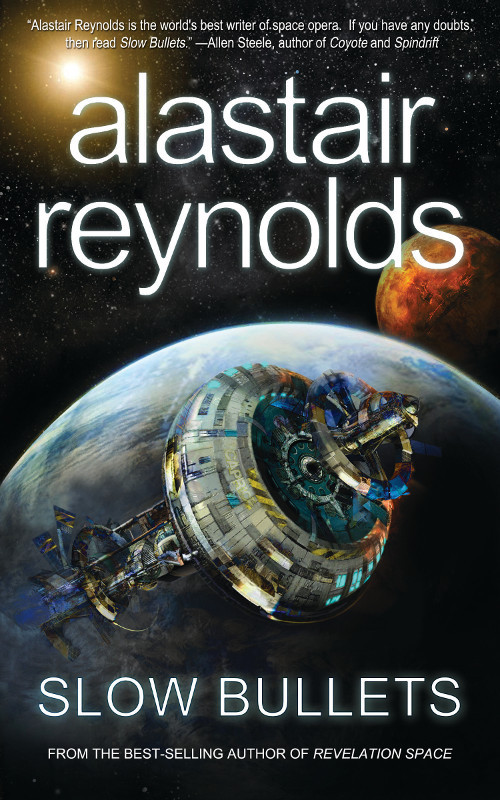SLOW BULLETS examines the philosophical, technological, and social issues of memory
The reviews for Alastair Reynolds’ enjoyable SLOW BULLETS keep rolling in.

From the LOS ANGELES REVIEW OF BOOKS:
The war crime is perpetrated at the conflict’s end: Scur grimly reports her own capture and subsequent torture by a group of renegade soldiers, led by the infamous war criminal Orvin. Though the details evoke a rape, the instrument of Scur’s torment is technological: the slow bullets that give the novella its name.
Readers unfamiliar with the larger body of the Reynolds’s work — a dozen novels and an impressive number of short stories, novellas, and collections — may be startled by the prose, which is disarmingly clinical, punctuated by instances of visceral phrasing. Some readers may find themselves thrown off balance by the juxtaposition of beauty and ugliness — or by the abrupt shift in circumstances that immediately follows: Scur awakens on an apparently derelict ship, surrounded by feuding soldiers from both sides of the conflict, and with no memory of how she came to be there. Readers familiar with Reynolds’s work, however, will know that these two threads must be intertwined. Reynolds is practiced in tying together apparently unrelated elements, and by the end of the story, the text irrevocably links bullet and poet.
<snip>
Slow Bullets, however, marks a development in Reynolds’s writing. As a storyteller, we see him experimenting with both the form and manner of narrative. We come to understand that the text’s “flaws” (that it is often repetitive and sometimes obtuse) are deliberate artifacts of its narration, a glimpse into the inner workings of Scur’s mind and motivations. As a writer, we see a more overtly thoughtful work examining the philosophical, technological, and social issues of memory.
<snip>
Like so much of Reynolds’s other writing, the message of Slow Bullets is ultimately ambivalent. Although Reynolds excels at weaving different threads together, his knots are convoluted, difficult things. Again, were this an “old” space opera, Scur’s exploits in unifying the crew and forging a tentative peace would be heroic. Instead, a twist or two at the end reminds the reader that Reynolds is too pragmatic to write anything so unequivocal.Slow Bullets is a story of revenge and redemption, high-tech problems and low-tech solutions, and the preservation of memory through surrendering the past — the failure to forgive but the possibility to forget.

Scur’s bête noir, the war criminal Orvin, was doing that to his victims for entertainment by the end of the conflict; and since she’s been a victim of it, you can guess that her revenge will be some variant on it when the chance comes. Nevertheless, what actually happens is unexpected, and ties together the various narrative threads of the book. Watchers of Gene Roddenberry’s Andromeda may find the ending less surprising, perhaps, but it’s none the worse for that. SLOW BULLETS has many fewer pages and a much less convoluted plot than Poseidon’s Wake, but it would be a mistake to dismiss it for those reasons – in its own way it’s an equally enjoyable read.
This being a novella instead of the usual time spent building up his world, Reynolds pretty much throws the reader right into things so it takes a little while to get into the story, but once you do, it’s a good read. The title refers to implants given to soldiers that contain their life histories, and as the ship fails and computer memory becomes precious, the characters must decide if they’ll hold onto their past or look to the future.
Rating: 8/10
For more info about SLOW BULLETS, visit the Tachyon page.
Cover art by Thomas Canty
Design by Elizabeth Story
